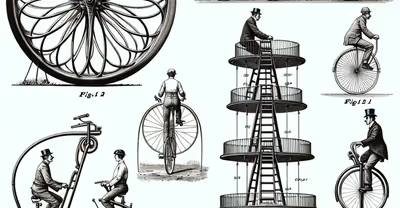
Key Takeaways
- Bamboo bikes provide eco-conscious riders with a sustainable cycling option.
- The natural properties of bamboo deliver both performance and comfort.
- Each bamboo bike frame represents unique craftsmanship and attention to detail.
Have you heard the buzz about bamboo bikes? Let’s explore why they're becoming the go-to choice for riders who care about our planet.
Eco-conscious riders are switching to bamboo bikes for their sustainable construction, low carbon footprint, durability, and unique aesthetics. These bikes offer a renewable resource, lightweight design, and water-resistant properties.
With years of hands-on experience and a passion for sustainable transportation, I've become a trusted expert in the world of bamboo bikes. My firsthand knowledge and expert opinions have guided countless riders toward eco-friendly choices. Let's embark on this journey together, exploring the benefits of bamboo bikes and revolutionizing the way we ride!
Why Eco-Conscious Riders Prefer Bamboo Bikes
As the world becomes more environmentally conscious, cyclists are seeking alternatives to traditional steel and carbon fiber bikes. Enter bamboo bikes—a sustainable option that meets the rider’s need for durability and environmental stewardship.
Unlike conventional materials, bamboo is a rapidly renewable resource that captures the essence of eco-friendly innovation in the cycling industry. Bamboo bike frames offer a unique blend of strength, comfort, and aesthetic appeal, making them a top choice for eco-conscious riders who do not want to compromise on performance or style.
The shift towards bamboo bikes resonates with those who prioritize sustainability without foregoing the joy of cycling.
These bikes are not just a statement of environmental awareness but also stand out for the smooth ride they provide, thanks to bamboo's natural vibration-damping qualities.
Moreover, the craftsmanship behind each bamboo frame offers a personal touch that mass-produced metal bikes lack—a feature especially appreciated by those who value individuality and meticulous handwork in their riding experience.
Let's explore the key factors making bamboo bikes the go-to choice for the environmentally aware cyclist.
Utilizes a Renewable Resource
Bamboo is one of the fastest-growing plants on the planet, renewing itself in as little as three to five years. This makes bamboo an incredibly sustainable material for bike production, minimizing the environmental impact that comes with using slower-renewing resources.
Low Carbon Footprint
Bamboo bikes have a significantly lower carbon footprint compared to traditional metal frames. The production process emits fewer carbon emissions, making it a genuinely eco-friendly choice for sustainable transportation.
Lightweight Nature
A key feature of a bamboo bike is its lightweight frame. This doesn't just make for a more comfortable ride; it also means less energy is required to pedal, enhancing the bike's overall efficiency.
Strength and Durability
Despite their lightness, bamboo frames are surprisingly strong and durable. With a tensile strength comparable to steel, they're constructed to endure the rigors of daily use, making them a reliable option for regular commutes.
Shock-Absorbent Features
The natural structure of bamboo lends it shock-absorbent and vibration-dampening characteristics, contributing to a smoother ride even on rough surfaces. This comfort is a major draw for riders looking for a less jarring cycling experience.
Biodegradability
When a bamboo bike has reached the end of its life, its biodegradable nature ensures that it won't linger in a landfill for centuries. Bamboo decomposes back into natural materials, aligning with the principles of environmentally conscious consumers.
Fast-Growing Source
The fast-growing nature of bamboo is a huge plus. It can be harvested without destroying the plant system, allowing for continual regrowth and a steady supply of this eco-friendly material for bamboo bike production.
Water-Resistant Properties
Bamboo's water-resistant qualities make for a durable bike frame that withstands various weather conditions. This versatility adds to the bike's longevity and the rider's peace of mind in unpredictable climates.
Unique Aesthetics
Every bamboo bike frame has a distinctive look, offering not just a mode of sustainable transportation but also a piece of artistic expression. The unique aesthetics of bamboo bikes stand out in a sea of cookie-cutter metal frames, reflecting the personality and values of the rider.
The Craftsmanship Behind Bamboo Bikes
Bamboo bikes merge traditional craftsmanship with sustainable innovation, creating not just a mode of transportation, but a work of art. Let's ride through the careful process these bikes undergo, from the selection of raw materials to the skilled touch of the craftsman.
Design and Manufacturing Process
Artisans transform raw, natural bamboo into a functional and aesthetically pleasing bike frame through a meticulous production process. This begins with the careful selection of bamboo canes, which are then heat-treated to increase durability and resistance to the elements.
They are shaped and joined together with metal or other natural fibers, ensuring a smooth ride. The manufacturing process not only requires technical skills but also a keen eye for design.
Materials and Engineering
Bamboo bike frames stand out due to their unique engineering properties. Bamboo is a frame material known for its resilience, providing a ride quality described by many as ‘comfortably natural’.
Local materials like hemp are also used to bind the joints, which adds to the frame’s shock-absorbing capabilities.
Material Strengths
- Bamboo: High tensile strength, shock absorption
- Steel: Durability, repairability
- Aluminum: Lightweight, corrosion resistance
- Titanium: Strength-to-weight ratio, corrosion resistance
- Carbon Fiber: Stiffness, lightweight
Comparison to Traditional Frames
Bamboo frames have a distinct advantage over traditional steel, aluminum, titanium, or carbon fiber frames.
Here’s a quick breakdown table of each material’s core benefits:
Workshop Expertise
Workshops crafting bamboo bikes often operate as social enterprises, contributing to local communities and economies. In places like Ghana, skilled artisans take pride in handcrafting each bamboo frame, utilizing knowledge passed down through generations.
The expertise these craftsmen bring to their work is unparalleled, and it's evidenced in the quality and uniqueness of every bike produced.
Sustainable and Social Impact
Choosing a bamboo bike isn't just about getting a durable, eco-friendly mode of transportation; it's also about making a positive environmental impact and endorsing social responsibility.
Many bamboo bike workshops operate with sustainability at their core, engaging in practices like local sourcing and reforestation. This connection to community and environment makes bamboo bikes more than a product — they're a statement.
User Reviews of Bamboo Bikes
Bamboo bikes have piqued the interest of eco-conscious riders across the US. They’re not just a statement of environmental awareness; these sustainable two-wheelers are being lauded for their unique blend of comfort and stability.
If you’re considering joining the ranks of green cyclists, here’s what fellow riders from various cycling experiences are saying:
Comfort and Ride Quality
- Smooth Ride: Users often report a notably comfortable ride due to the natural vibration-damping properties of bamboo.
- Weight: A common misconception is that bamboo bikes would be heavy. However, riders point out they are surprisingly lightweight.
Durability and Performance
- Stability: Bamboo frames provide stability without sacrificing flexibility, appealing to those who ride on varied terrain.
- Weight Capacity: Riders are impressed with the robustness, handling well above average weight loads.
Design and Customization
- Unique Appearance: Every bike is a work of art, celebrating unique patterns and joints, much appreciated by the cyclers.
- Customization: The ability to tailor features is a hit among cyclists. The ability for customization includes everything from frame geometry to the choice of wheels.
Social Impact and Innovation
- Supporting Local Crafts: Many cyclists love the idea of buying a bamboo bike because it supports local artisans, especially in regions like Africa and Vietnam.
- Innovation: Riders recognize bamboo bikes as a symbol of innovative sustainable design, merging traditional craftsmanship with modern cycling technology.
Economic Perspective
- Price Points: While not necessarily cheaper, the cost is often justified by buyers due to the longevity and unique attributes of the bamboo bike.
Frequently Asked Questions
Eco-conscious riders are recognizing the sustainable and community-supporting benefits of bamboo bikes. Let's dig into some specifics.
What makes bamboo bikes a more sustainable choice compared to traditional materials?
Bamboo is an incredible renewable resource, growing rapidly and absorbing carbon at a higher rate than many other plants. Traditional materials such as aluminum require energy-intensive extraction and processing, while bamboo simply needs to be harvested and treated. Choosing a bamboo bike directly supports sustainability efforts.
How does the production of bamboo bicycles benefit the environment?
The environmental footprint of manufacturing bamboo bicycles is minimal. Bamboo has a natural advantage; its growth doesn't necessitate harmful pesticides or fertilizers, and it continuously regenerates after cutting. This leads to a production cycle that's kinder to the planet, reducing the negative impact that traditional bike production has on the environment.
In what ways do bamboo bikes support local communities and economies?
Bamboo bike production often takes place in smaller, localized workshops. This supports local economies and craftspeople. By purchasing a bamboo bike, you're not just buying a product, you're investing in sustainable jobs and preserving crafting skills that might otherwise be lost.
How does the durability of bamboo bikes compare to those made with conventional materials like steel?
Bamboo boasts an impressive strength-to-weight ratio, rivaling that of steel and sometimes surpassing it. Properly treated bamboo can withstand the rigors of the road, making it just as durable, if not more so, than conventional materials.
What factors contribute to the higher cost of bamboo bicycles?
Bamboo bikes are often handmade, requiring skilled labor and hours of craftsmanship, which contributes to a higher price point. Plus, the sourcing of sustainably grown, high-quality bamboo, along with the specialized treatment needed to prepare it for bike construction, can add to the costs.




















































































































































































































































































































































































































































































































































































































































































































































.avif)
